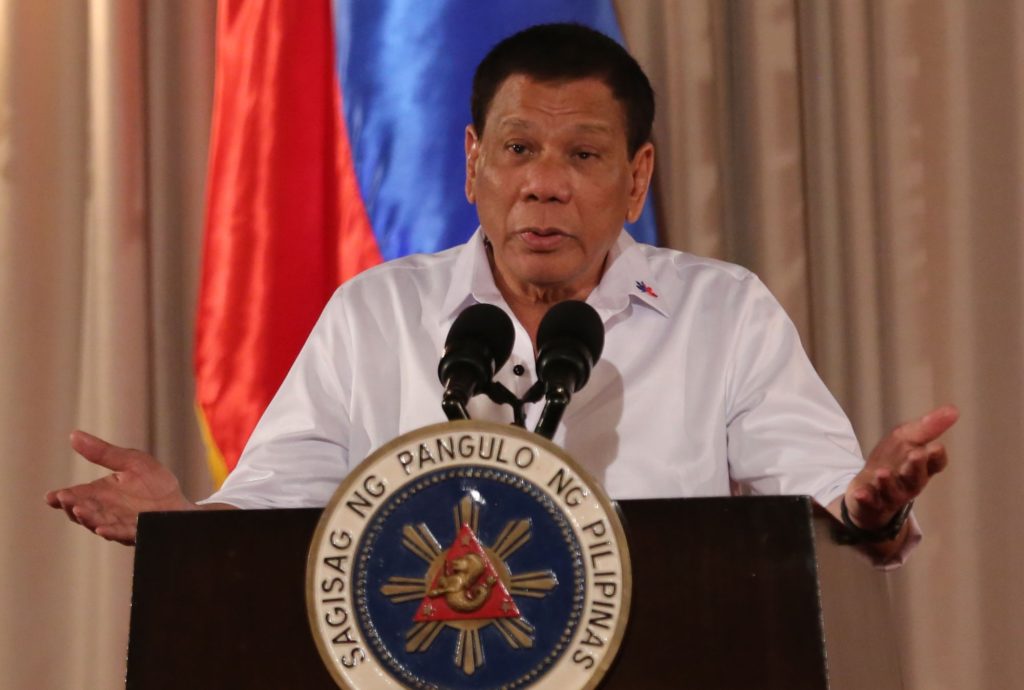
President Rodrigo Duterte
(INQUIRER FILE PHOTO)
Manila — President Duterte will push for the approval of the first package of the comprehensive tax reform program in his State of the Nation Address (Sona) today, according to Budget Secretary Benjamin E. Diokno.
The package has been designed to generate more revenues to finance ambitious infrastructure projects and make the tax system more equitable, Diokno said.
The President would also present “solid accomplishments” of the Duterte administration after one year in power, Diokno told reporters on the sidelines of a forum last Friday.
“This [Sona] is not only about drugs or criminality… For instance, during his Sona, the President will submit the proposed 2018 national budget to Congress,” Diokno said.
The Department of Budget and Management is eyeing approval of the P3.767-trillion 2018 budget by October to give agencies more time to plan their respective spending programs and avoid underspending.
Besides next year’s budget proposal, Diokno said economic managers had pitched for inclusion in the President’s Sona a number of priority legislation, including the budget reform bill, the national government right-sizing bill, the national ID system, as well as the comprehensive tax reform.
“I think he [President Duterte] will make an appeal to Congress to have it passed,” Diokno said, referring to the first package aimed at slashing personal income tax rates while jacking up taxes on consumption.
Before Congress went on sine die adjournment, the House of Representatives approved House Bill (HB) No. 5636 containing the Department of Finance’s (DOF) proposal as well as other related measures, including a P10-per-liter excise tax on sugar-sweetened drinks, among others.
During the recess, the Senate committee on ways and means led by Sen. Sonny Angara conducted weekly public hearings on HB 5636 and related pending bills so that senators could immediately work on the tax reform proposal upon the resumption of Congress sessions.
“The tax reform program is crucial to the whole fiscal picture. At least for me, the value of tax reform is to give the international community an assurance that we can pay” or finance the massive infrastructure projects to be rolled out by the Duterte administration in the next six years under its “Build, Build, Build” program.
The government plans to spend up to P9 trillion on hard infrastructure until 2022 to usher in a “golden age of infrastructure,” Diokno had said.
Also, “even if we’re not going to use part of the revenues [from tax reform], the mere fact that our tax system is not competitive with other Asean countries — we have high rates and these have not been changed for a long, long time — we really need to restructure it,” Diokno said.
Finance Secretary Carlos G. Dominguez III told a press conference Friday that he considered the approval of the Tax Reform for Acceleration and Inclusion Act or “Train” by the House of Representatives on May 31 as one of the “major accomplishments” of the Duterte administration thus far.
“The fact that in less than 90 days we were able to submit the tax reform bill, and that the House passed the tax reform bill and now it is in the Senate, so it’s a continuous struggle for that,” said Dominguez, who heads President Duterte’s economic team.
The DOF pitched the first tax reform package to both chambers of Congress as early as September last year, although the DOF-backed bill or HB 4774 was only introduced in the House by the ways and means committee chair, Quirino Rep. Dakila Carlo Cua, in January this year.
The DOF had nonetheless admitted that the House-approved version was watered down and would raise less revenues than the original proposal, hence posing a risk to the country’s investment grade credit ratings.